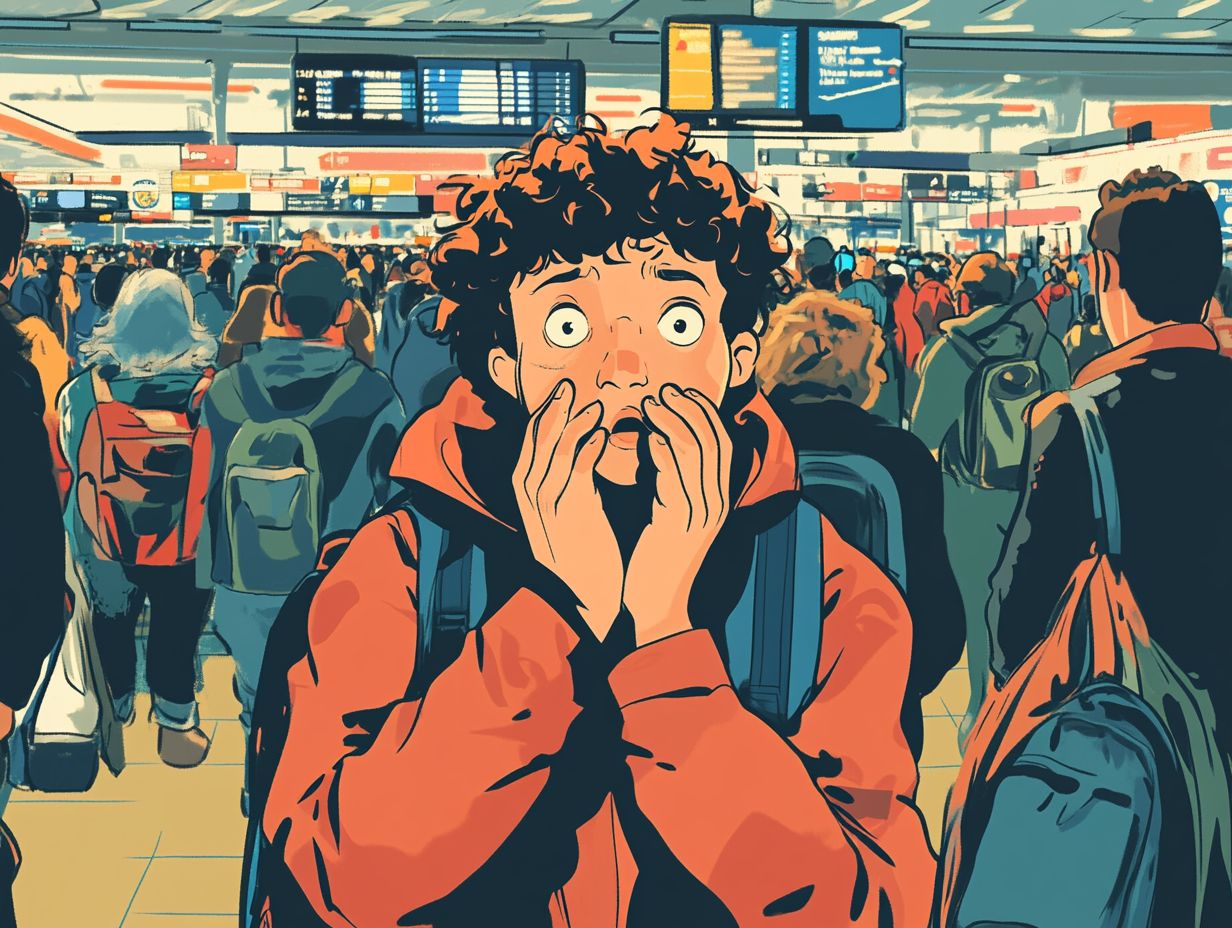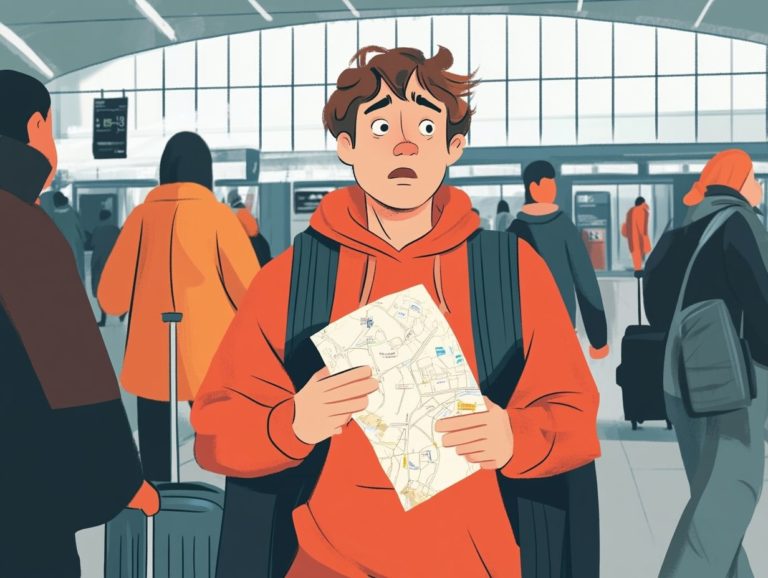How to Deal with Culture Shock?
Culture shock is an all-too-familiar experience for anyone stepping into unfamiliar environments. As you navigate new customs, languages, and social norms, it’s common to feel a sense of confusion and disconnection.
This article explores the causes of culture shock. It also highlights key signs to watch for. It offers practical coping strategies and tips to help prevent the emotional turbulence that often accompanies cultural transitions.
Whether you’re traveling, studying abroad, or relocating for work, grasping the nuances of culture shock can empower you to adapt and truly thrive in your new surroundings.
Contents
Key Takeaways:

- Prepare for culture shock by researching the new culture.
- Stay open-minded and willing to adapt.
- Utilize coping strategies, like seeking support.
What is Culture Shock?
Understanding culture shock is essential for your success as an international student embarking on your study abroad adventure. This nuanced experience encapsulates the emotions and challenges you ll face while adjusting to new environments.
Culture shock often brings about significant confusion and discomfort as you navigate the intricacies of unfamiliar cultures, whether it s Japan or Denmark. By acknowledging the various dimensions of culture shock, you can better equip yourself for the ups and downs that accompany cultural immersion.
This awareness empowers you to develop effective strategies for navigating your new city while wholeheartedly embracing its differences.
Culture shock is that jarring mix of confusion and disorientation you might feel when entering a new culture, especially during international travel or study abroad programs.
This experience can trigger a whirlwind of emotions from anxiety and frustration to fascination and excitement as you navigate unfamiliar customs and traditions. For example, if you come from a culture that values direct communication, you may feel bewildered in settings where indirect expressions and non-verbal cues dominate.
Then there are local dishes, like spicy street food or fermented delicacies, that can leave you surprised or even a bit uncomfortable, prompting you to dive deeper into the world of taste and texture.
Communication barriers, especially language differences, can heighten that sense of isolation, making it tough to build connections. Ultimately, grasping these cultural nuances is crucial for helping you adapt and truly feel at home in a new environment.
Causes of Culture Shock
A myriad of factors contributes to the experience of culture shock, especially for international students like yourself. You find yourself navigating unfamiliar transit systems, adapting to new traditions, and reconciling cultural differences that accompany your journey abroad.
Factors that Contribute to Culture Shock

The primary factors contributing to your culture shock include communication barriers, emotional responses, and significant cultural differences you encounter in your new environment.
These elements can profoundly impact how you interact and connect with those around you, often leading to misunderstandings and feelings of alienation. For instance, language differences may hinder your ability to express thoughts and feelings, leaving you feeling frustrated and misinterpreted. This frustration can trigger emotional responses like homesickness as you long for the familiarity of your homeland.
Cultural discomfort, stemming from contrasting social norms and practices, further complicates your adjustment process, making even simple interactions feel daunting. You may struggle with non-verbal cues that differ significantly from what you’re used to, perpetuating a sense of isolation in your quest to forge meaningful connections.
Signs and Symptoms of Culture Shock
Recognizing the signs and symptoms of culture shock is essential for you as an international student. You might encounter various physical and emotional indicators, such as homesickness and an uneasy sense of cultural discomfort (the awkward feelings you might have when facing new customs or behaviors).
Understanding these feelings can help you navigate this challenging transition more effectively.
Physical and Emotional Indicators
The physical and emotional signs of culture shock can manifest in ways that might surprise you. Symptoms like fatigue and anxiety often arise from the stress of immersing yourself in a new culture. Emotional responses such as sadness or irritability may also occur.
For many international students, this often leads to feeling very tired, making daily tasks like attending classes or joining social events feel like climbing a mountain. Anxiety may heighten as you navigate unfamiliar situations. This can lead to avoiding connections with others.
You might also experience waves of sadness during bouts of homesickness or feel irritable while grappling with local customs or language subtleties. These emotional hurdles can create barriers to forming friendships and savoring the enriching experiences that studying abroad offers.
By recognizing these connections, you ll feel empowered to seek help, whether from peers, counselors, or cultural organizations. Creating a supportive community can make your transition easier during this important life change.
Coping with Culture Shock
Coping with culture shock involves employing effective strategies to manage emotional responses and understand a new culture. For international students, these tips for adjusting to life in a new culture can empower them to cultivate personal growth while forging meaningful connections with locals.
Strategies for Dealing with Culture Shock

Strategies for navigating culture shock often center around overcoming communication barriers, embracing cultural differences, and learning how to prepare for cultural differences by fully immersing yourself in the local community and venturing into new places.
As an international student, you can greatly benefit from practical tools and opportunities that make your transition smoother. Utilizing language learning apps like Duolingo or Babbel can significantly enhance your vocabulary and conversational skills, helping to minimize misunderstandings.
Joining travel forums offers valuable insights into local customs, recommended experiences, and tips from others who have faced similar challenges. By actively participating in local events be it cultural festivals, workshops, or community service you ll connect with residents, forge new friendships, and gain a richer understanding of the customs that define your new home.
Engaging in these strategies not only eases your adaptation but also enriches your overall experience while studying abroad.
Preventing Culture Shock
Preventing culture shock starts with careful planning for your new environment. This involves looking into the local norms, identifying cultural similarities, and setting realistic expectations for your adjustment journey.
By equipping yourself with this knowledge, you ll navigate the transition more smoothly and embrace your new culture with confidence.
Preparing for a New Culture
Preparing for a new culture requires an exploration that emphasizes understanding the norms, customs, and traditions unique to your new environment, enabling you to navigate it with greater ease.
By immersing yourself in the rich tapestry of local life, you ll uncover vital social etiquette that fosters respect and builds connections within your host community. For example, knowing whether to shake hands or bow can make a significant difference in those all-important first impressions.
Getting familiar with basic language phrases not only facilitates everyday interactions but also demonstrates your genuine appreciation for the local culture. Your mental preparation is equally important; adopting a mindset of openness and adaptability will help you embrace the unpredictability of these new experiences.
Journaling your feelings or discussing any concerns with peers can provide valuable emotional support, reinforcing your resilience as you embark on this transformative journey.
Start preparing today to make the most of your adventure!
Adapting to a New Culture
Adapting to a new culture is vital for international students. You ll gradually learn local customs and explore exciting local cuisine.
This journey enhances personal growth and helps you forge connections within the community. By actively participating in local events like festivals, workshops, or sports you’ll gain a deeper understanding of the host culture.
Exploring local foods, whether at vibrant street markets or cozy neighborhood restaurants, opens the door to new flavors and traditions. Keeping an open mind enables you to appreciate the unique differences of each culture.
Diving into an unfamiliar tradition can lead to meaningful friendships and a genuine sense of belonging. This transforms the adjustment process into something both rewarding and enjoyable.
Frequently Asked Questions

What is culture shock and how do I deal with it?
Culture shock is the feeling of confusion and anxiety when experiencing a new culture. To deal with it, learn how to handle homesickness and culture shock by keeping an open mind, being patient, and seeking support from others.
What are some common symptoms of culture shock?
Common symptoms include homesickness, feelings of isolation, frustration, and physical symptoms like fatigue and insomnia. These reactions are normal in a new environment.
How can I prepare for culture shock before traveling?
Before traveling, learn about the culture, customs, and traditions of your destination. This research helps you prepare mentally for your arrival.
What are some ways to cope with culture shock?
Finding similarities between your culture and the new one can help you feel more connected. Also, explore activities or hobbies you enjoy in your new environment.
How long does culture shock usually last?
The duration varies for each person, typically lasting a few weeks to a few months. As you become familiar with the new culture, symptoms should lessen.
What should I do if I’m struggling with culture shock?
If you’re struggling, talk to someone about how you feel. This can be a friend, family member, or professional counselor. Maintain a healthy lifestyle by eating well, exercising, and getting rest to manage physical symptoms.





